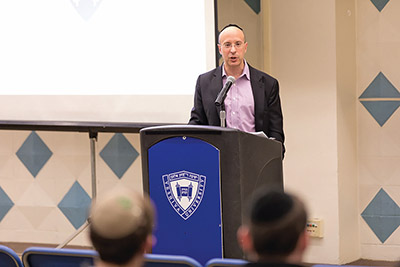
(Courtesy of Yeshiva University) On February 14, Yeshiva University students studying finance and computer science gathered on YU’s Wilf Campus for a Q & A session with Elisha Wiesel, chief information officer of Goldman Sachs. The talk was hosted by Judah Diament, program director of undergraduate data science and professor and co-chair of computer science at Yeshiva College.
Wiesel spoke to students about his 23-year tenure building the information architecture that Goldman uses to manage its businesses. Goldman has created a technological structure, he explained, that both centralizes information and systems management while distributing to every Goldman employee the means to query that information to assess risk, gain and prediction in very fine-grained ways.
However, as he pointed out, this simple description does not capture the dynamic back-and-forth that happens between what he called “the technicians in the core office and the traders on the floor.” Technologists must learn the core practices of the Goldman businesses they serve to deliver the services the businesses need; at the same time, the businesses must be conversant enough with the technology so that they not only know what can be done but also know what to ask for in terms of improvements.
Before taking questions, he concluded his talk by saying, “The best approach for us in finding solutions to our challenges is to embed smart people with certain skill sets into a problem, provide them with the means to identify the problem and then let them dig as deep as they can to find the solution.”
Many students were understandably interested in finding out what skills they would need to work for companies such as Goldman Sachs. Wiesel said that everyone should learn to code to some degree; that information workers must have what he called “lateral skills,” character aspects such as an excited curiosity about the world and a passionate desire to pursue a problem’s solution doggedly and that hopefuls must continue their learning beyond their formal education. “We have never lived in a better time to learn anything,” Wiesel noted, “and there is no barrier to finding a way to learn what you want to learn.”
In response to a question about how the legacy of his father, writer, activist and Holocaust survivor Elie Wiesel, has influenced his career, he spoke movingly about how he believes that his father’s greatest skill was “listening to people closely and making them feel like a human being.” He wanted his legacy at Goldman to reflect that he did the same thing for the people who worked for him by making the profession of technician equal in status to the traders and other financial people in the company. But more importantly, “How I raise my children is the best way for me to honor my father—that will be my true legacy.”
Wiesel was impressed with the students he met, calling them “quality individuals.” He also emphasized the need for computer science programs to focus on the skills students need to succeed as individuals and as team members, saying, “Good computer science programs get their students to code (especially collaboratively) and build things in addition to learning theory.”
Diament was pleased with the event. “Hearing a talented technology leader talk about his own career as well as what the firm looks for in new hires is an excellent way to help the students understand what they need to do in college while giving them a perspective on what to expect in a tech career.” He added that “Elisha Wiesel’s visit is another example of YU’s commitment to giving our computer science students the guidance and industry knowledge to succeed.”













